LIMK-1/2 (PTR2545) Mouse mAb
- Catalog No.:YM4686
- Applications:WB;ELISA
- Reactivity:Human; Mouse (predicted: Rat)
- Target:
- LIMK-1/2
- Fields:
- >>Axon guidance;>>Fc gamma R-mediated phagocytosis;>>Regulation of actin cytoskeleton;>>Yersinia infection;>>Human immunodeficiency virus 1 infection
- Gene Name:
- LIMK1 LIMK
- Protein Name:
- LIM domain kinase 1 (LIMK-1) (EC 2.7.11.1)
- Human Swiss Prot No:
- P53667/P53671
- Rat Swiss Prot No:
- P53669
- Immunogen:
- Synthesized peptide derived from human LIMK-1/2 AA range: 500-600
- Specificity:
- This antibody detects endogenous levels of LIMK-1/2 at Human, Mouse,Rat
- Formulation:
- PBS, pH7.4, 50% glycerol, 0.03%Proclin 300
- Source:
- Mouse,monoclonal:IgG1,Lambda
- Dilution:
- WB 1:500-2000 ELISA 1:5000-20000
- Purification:
- Protein G
- Storage Stability:
- -15°C to -25°C/1 year(Do not lower than -25°C)
- Other Name:
- LIM domain kinase 1 (LIMK-1) (EC 2.7.11.1)
- Observed Band(KD):
- 70kDa
- Background:
- LIM domain kinase 1(LIMK1) Homo sapiens There are approximately 40 known eukaryotic LIM proteins, so named for the LIM domains they contain. LIM domains are highly conserved cysteine-rich structures containing 2 zinc fingers. Although zinc fingers usually function by binding to DNA or RNA, the LIM motif probably mediates protein-protein interactions. LIM kinase-1 and LIM kinase-2 belong to a small subfamily with a unique combination of 2 N-terminal LIM motifs and a C-terminal protein kinase domain. LIMK1 is a serine/threonine kinase that regulates actin polymerization via phosphorylation and inactivation of the actin binding factor cofilin. This protein is ubiquitously expressed during development and plays a role in many cellular processes associated with cytoskeletal structure. This protein also stimulates axon growth and may play a role in brain development. LIMK1 hemizygosity is implicated in the impaired visuospatial constructive cog
- Function:
- catalytic activity:ATP + a protein = ADP + a phosphoprotein.,disease:Haploinsufficiency of LIMK1 may be the cause of certain cardiovascular and musculo-skeletal abnormalities observed in Williams-Beuren syndrome (WBS), a rare developmental disorder. It is a contiguous gene deletion syndrome involving genes from chromosome band 7q11.23.,function:Protein kinase which regulates actin filament dynamics. Phosphorylates and inactivates the actin binding/depolymerizing factor cofilin, thereby stabilizing the actin cytoskeleton. Isoform 3 has a dominant negative effect on actin cytoskeletal changes. May be involved in brain development.,PTM:Autophosphorylated.,PTM:Phosphorylated on serine and/or threonine residues by ROCK1. May be dephosphorylated and inactivated by SSH1.,similarity:Belongs to the protein kinase superfamily. TKL Ser/Thr protein kinase family.,similarity:Contains 1 PDZ (DHR) doma
- Subcellular Location:
- Cytoplasm . Nucleus . Cytoplasm, cytoskeleton . Cell projection, lamellipodium . Predominantly found in the cytoplasm. Localizes in the lamellipodium in a CDC42BPA, CDC42BPB and FAM89B/LRAP25-dependent manner. .
- Expression:
- Highest expression in both adult and fetal nervous system. Detected ubiquitously throughout the different regions of adult brain, with highest levels in the cerebral cortex. Expressed to a lesser extent in heart and skeletal muscle.
- June 19-2018
- WESTERN IMMUNOBLOTTING PROTOCOL
- June 19-2018
- IMMUNOHISTOCHEMISTRY-PARAFFIN PROTOCOL
- June 19-2018
- IMMUNOFLUORESCENCE PROTOCOL
- September 08-2020
- FLOW-CYTOMEYRT-PROTOCOL
- May 20-2022
- Cell-Based ELISA│解您多样本WB检测之困扰
- July 13-2018
- CELL-BASED-ELISA-PROTOCOL-FOR-ACETYL-PROTEIN
- July 13-2018
- CELL-BASED-ELISA-PROTOCOL-FOR-PHOSPHO-PROTEIN
- July 13-2018
- Antibody-FAQs
- Products Images
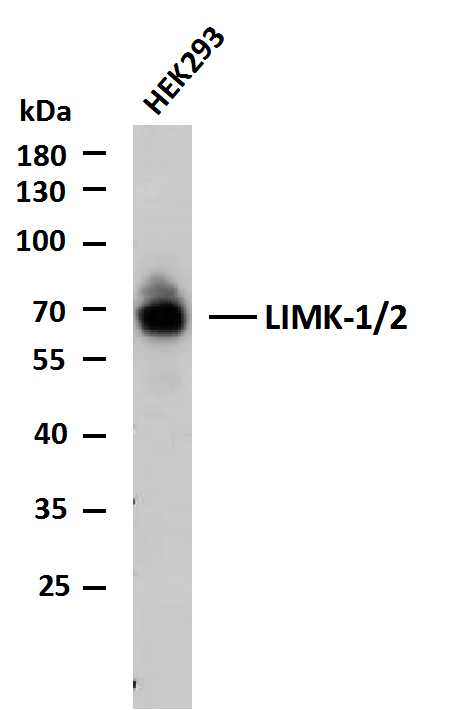
- Whole cell lysates of HEK293 were separated by 10% SDS-PAGE, and the membrane was blotted with anti-LIMK-1/2(PTR2545) antibody. The HRP-conjugated Goat anti-Mouse IgG(H + L) antibody was used to detect the antibody. Lane 1: HEK293 Predicted band size: 65,72kDa Observed band size: 68,72kDa
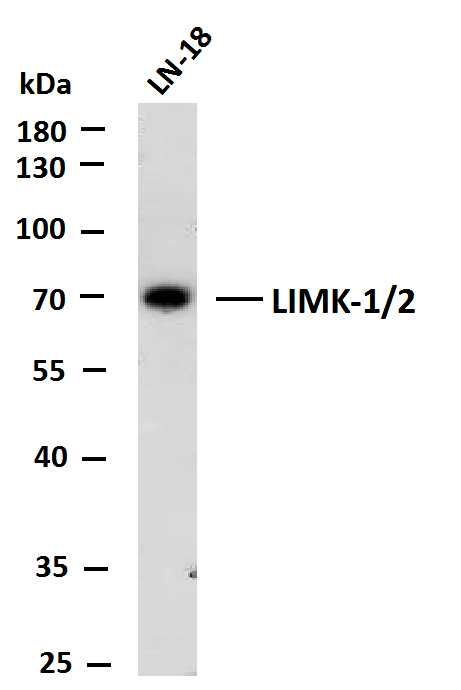
- Whole cell lysates of LN-18 were separated by 10% SDS-PAGE, and the membrane was blotted with anti-LIMK-1/2(PTR2545) antibody. The HRP-conjugated Goat anti-Mouse IgG(H + L) antibody was used to detect the antibody. Lane 1: LN-18 Predicted band size: 65,72kDa Observed band size: 70kDa
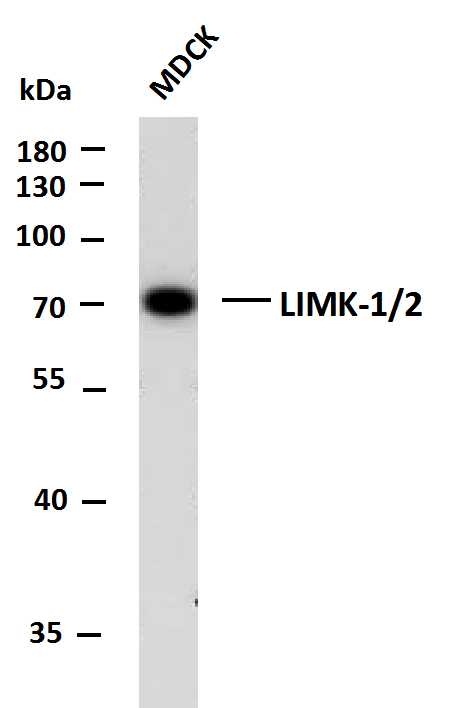
- Whole cell lysates of MDCK were separated by 10% SDS-PAGE, and the membrane was blotted with anti-LIMK-1/2(PTR2545) antibody. The HRP-conjugated Goat anti-Mouse IgG(H + L) antibody was used to detect the antibody. Lane 1: MDCK Predicted band size: 65,72kDa Observed band size: 70kDa
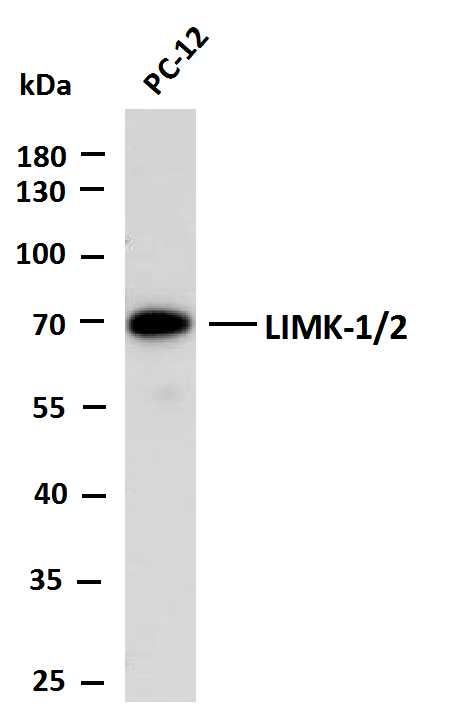
- Whole cell lysates of PC-12 were separated by 10% SDS-PAGE, and the membrane was blotted with anti-LIMK-1/2(PTR2545) antibody. The HRP-conjugated Goat anti-Mouse IgG(H + L) antibody was used to detect the antibody. Lane 1: PC-12 Predicted band size: 65,72kDa Observed band size: 70kDa
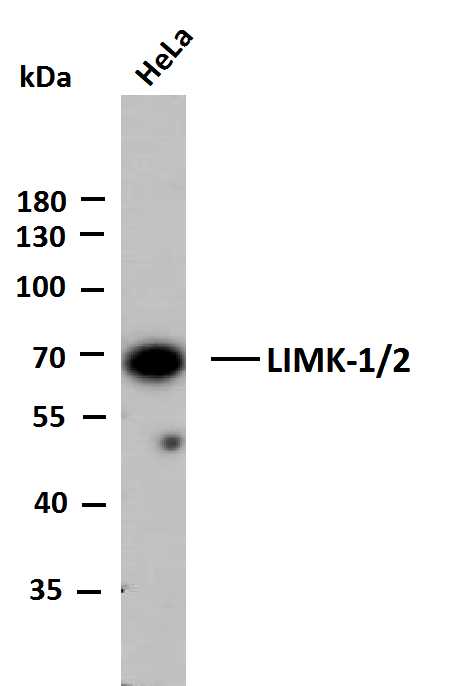
- Whole cell lysates of HeLa were separated by 10% SDS-PAGE, and the membrane was blotted with anti-LIMK-1/2 antibody. The HRP-conjugated Goat anti-Mouse IgG(H + L) antibody was used to detect the antibody. Lane 1: HeLa Predicted band size: 65,72kDa Observed band size: 68kDa
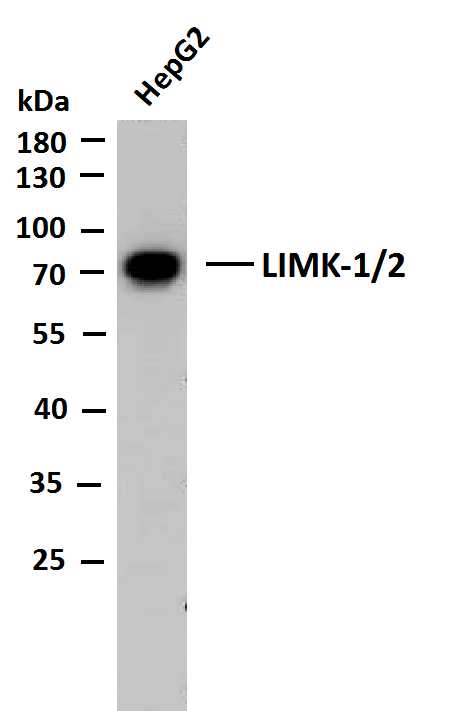
- Whole cell lysates of HepG2 were separated by 10% SDS-PAGE, and the membrane was blotted with anti-LIMK-1/2 antibody. The HRP-conjugated Goat anti-Mouse IgG(H + L) antibody was used to detect the antibody. Lane 1: HepG2 Predicted band size: 65,72kDa Observed band size: 72kDa
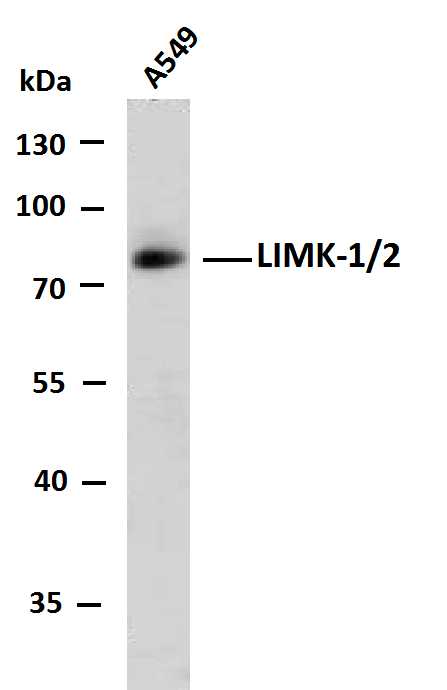
- Whole cell lysates of A549 were separated by 10% SDS-PAGE, and the membrane was blotted with anti-LIMK-1/2 antibody. The HRP-conjugated Goat anti-Mouse IgG(H + L) antibody was used to detect the antibody. Lane 1: A549 Predicted band size: 65,72kDa Observed band size: 72kDa



